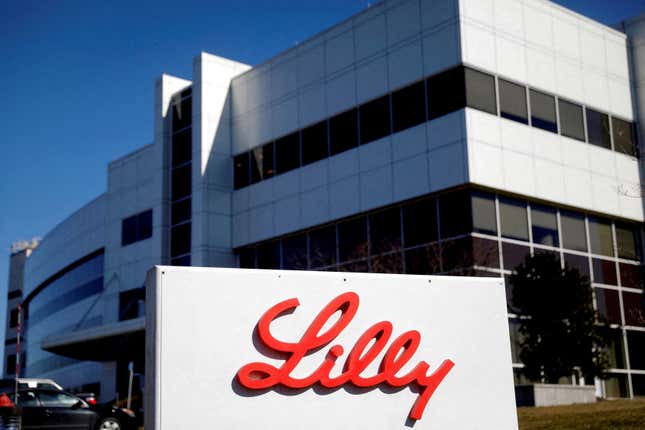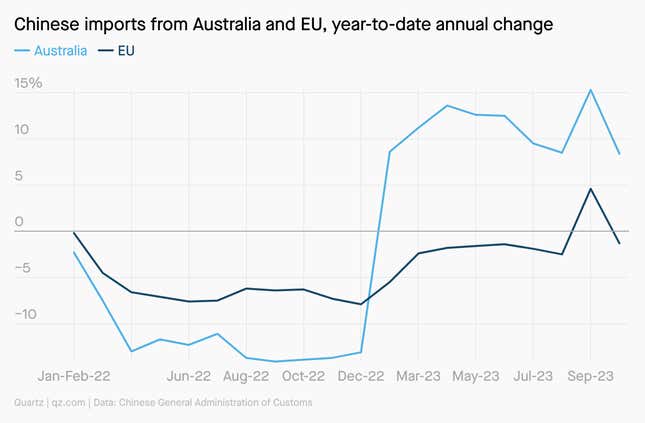
Good morning, Quartz readers!
Here’s what you need to know
US and UK regulators approved a new weight-loss drug from Eli Lilly. Zepbound, a version of diabetes drug Mounjaro, helped people lose as much as 40-60 lbs (18-27 kg) in controlled studies.
Disney expanded its cost-cutting plan by $2 billion. Quarterly profit topped estimates, thanks to ESPN and parks, and the House of Mouse added more Disney+ subscribers. Meanwhile, US neighborhood social media network Nextdoor made its own cost-cutting move, laying off a quarter of its staff.
Arm’s first earnings post-IPO sent its shares down. The UK-based chip designer missed revenue expectations, but outperformed in sales.
Microsoft’s all-time high stock price had a lot—but not everything—to do with OpenAI. The company’s stock was on an upward trajectory for more than a week, hitting $360 after OpenAI had some good news to share at its developer conference.
China’s trade with Australia is warming up
Leaders from Australia and China both have some glowing words for how trade talks are going this week, but warming relations between the two countries can be seen in the numbers, too. So far this year, Chinese imports from Australia have risen 8.4%. That’s a stark difference from the EU, where trade with China is slumping as tensions rise over the bloc’s probe into Chinese electric vehicle subsidies.

Beijing has several incentives to keep repairing its ties with Australia. Quartz’s Mary Hui lists them.
Pop quiz: The Tesla Supercharger holdouts
Which major automaker hasn’t committed to using Tesla’s North American Charging Standard for their electric vehicles?
A. Stellantis
B. Ford
C. General Motors
D. Volvo
We’ll give you the answer—it’s Stellantis. But that’s not the only major holdout, and with even smaller startups like Lucid going the NACS way, their hesitation likely won’t last long. It’s all part of Tesla’s plan to build an entire ecosystem—and boy, did that plan work.
The Amazon-Rivian split was good for both
Rivian can now tout its NACS compatibility to potential prospects, as the EV maker is newly (mostly) single and ready to mingle with customers who are looking to buy its battery-powered delivery vans.
That’s because the EV maker and Amazon have ended their exclusive arrangement under which Rivian sold the vans just to Amazon. But the divorce is a happy one—at least in an economic sense.
Quartz’s most popular
⚡ Elon Musk’s pessimism about the Tesla Cybertruck was very much warranted…
🪧 …while Tesla’s biggest labor union fight is happening in Europe. Is the US next?
🤖 Also, can we take Elon Musk’s new chatbot seriously?
🪫 Thanks to US curbs, Chinese internet giants are seeking suppliers outside of Nvidia
🪡 The secret to sticking with a project
🥧 How to make the perfect pie crust, according to science
Surprising discoveries
The world’s largest aircraft is here. Makers of the giant blimp-like ship hope it’ll bring about a new era of electric flying.
Love can last 265 years. Letters to French sailors composed by their wives and family in 1757 are finally being read.
The US energy drink market is anything but stale. Just look at Celsius, which is drinking up market shares long dominated by Red Bull and Monster.
Nature only just retracted that mind-boggling semiconductor paper that wasn’t. It was published in March and drew significant criticism from the scientific community.
A fifth of a human’s daily diet contains wheat. The crop is much more than bread (or pasta, or cake, or sourdough), and its trade holds powers both social and political. The wheat trade is the topic of our latest weekly Obsession—sign up to get the email each Wednesday.
Did you know we have two premium weekend emails, too? One gives you analysis on the week’s news, and one provides the best reads from Quartz and elsewhere to get your week started right. You can get those by becoming a member—and take 20% off!
Our best wishes for a productive day. Send any news, comments, energy drinks, and wheat-free bread to [email protected]. Today’s Daily Brief was brought to you by Morgan Haefner.